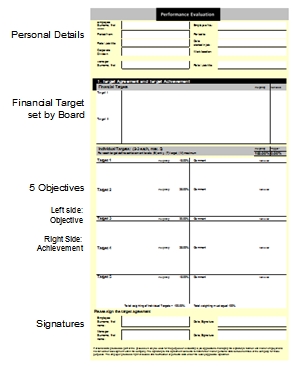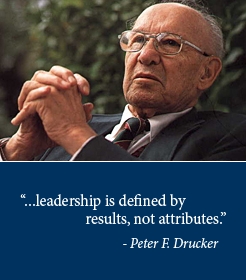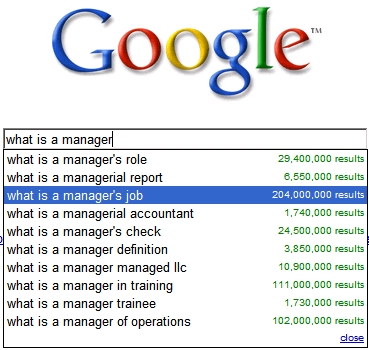The Labyrinth of Objectives
April 15, 2009 Leave a comment
At our weekly “Heads-Of-Department”-Meeting we recently included a session with our HR partner to talk about the objective-setting, -review and -appraisal processes each of us is asked to run in our department. Nothing really new, just a good reminder how things are supposed to work. Aligned with global guidelines of course and all based upon the concept of “Management By Objectives” (MBO). As usual, we didn´t have enough time to discuss in greater detail, so we only briefly touched the issues of how to best make objectives individually measurable. And potential bonus allocations fair and transparent. As most of our objectives are change oriented and project related, the simple MBO definition leaves me with a sense of unsatisfaction and the desire to reflect more about the subject, that impacts our wallets, motivation and careers.
Since 1954 Divisions, Departments, Teams and Individuals are managed by objectives. The term “Management By Objective” was defined by Peter Ferdinant Drucker´s books “The Practice of Management” and “The Effective Executive”. No doubt, his thinking transformed corporate management in the latter half of the 20th century as well as the professional life of millions. (any studies on this, facts? Shure not everybody did) since then. In over 66 years, Drucker wrote more than three dozen books which got translated into 30 languages. He is often called the founding father of the study of Management as well as the world’s most influential business guru. His work influenced Winston Churchill, Bill Gates, Jack Welch and the Japanese business establishment.
Peter Ferdinand Drucker (November 19, 1909 – November 11, 2005) – writer, management consultant and university professor – was born in Vienna, Austria in November 1909. After receiving his doctorate in Public and International Law from Frankfurt University in Frankfurt, Germany, he worked as an economist and journalist in London before moving to the United States in 1937.
In 1939, Peter F. Drucker published his first book, “The End of Economic Man”. In 1950 he then joined the faculty of New York University’s Graduate Business School as Professor of Management. He was Clarke Professor of Social Science and Management since 1971 at the Claremont Graduate University in Claremont, California. The University named its management school after him in 1987.
Mr. Drucker pioneered the idea of privatization and the corporation as a social institution. He coined the terms “knowledge workers” and “management by objectives”. His seminal study of General Motors in 1945 introduced the concept of decentralization as a principle of organization, in contrast to the practice of command and control in business.
A Business Week´s article honoured his work when he died at the age of 95 stating that Druckers ideas still matter. I think it is true, at least as far as my experience goes. In all the organizations I worked so far, yearly objectives were agreed with the next level manager based upon the companies strategy and plans. Not as often as we wanted to, they were reviewed and adjusted regularly during the year. Came the end of the year, the individual performance against the individual objectives were formally assessed and the bonus participation calculated based upon the outcome of the assessment.
Good objectives are supposed to be smart (specific, measurable, achivable, relevant, timebound). For the sophisticated of us, ranges of achivement ( e.g. 50%,75%, 100%) are documented as part of the agreement in the beginning. With this, it would allow to determin at the end of the year how much of each objective has been met and how much bonus is payed out in a transparent way.
An example for a retail car salesmen in a decent location with attrachive cars and good marketing activities would be: Have 2000 sales orders signed and registered in the sales system for new cars between 1.Jan and 31Dec. With this, a percentage can be easily calculated: e.g. 1000 sold cars make 50%.
I would call this a one dimentional objective. Of course, in real life s.a.r.t. objectives are much more complicated, even the simple example given one could be understood differently by different people and therefore laterone the bonus determination been seen as “unfair”. An interesting study about The unintended consequences of management by objectives: the volume growth target at Volvo Cars shows more.
The problem gets much more complex with multidimentional objective, that you typically find in projects. The project-objective is 100% met if it is completed on time, with agreed quality and budget. But what would 75% exactly mean? What do I have to tell a project manager about the conditions in relation to time, quality and cost that need to be met in order to receive a e.g.75% bonus? Does MBO make sense for projects, or would a balanced scorecard approach be more relevant as it considers mutiple dimensions?
 Good questions I think. But I got a far more trivial problem with objectives in my firm, where we have to use the corporate template that feeds the corporate I-do-not-know-which system. I can only define 5 objectives, which all need to fit on one page. The way the template is constructed, I can maybe use 20% of an A4 page. Which leaves me with the dilema that I cannot be specific enough and therefore not really objective when it comes to the bonus. And if I formulate them “on a higher level” they start looking like job descriptions, which would make them utimatively redundant – we hate doubble work.
Good questions I think. But I got a far more trivial problem with objectives in my firm, where we have to use the corporate template that feeds the corporate I-do-not-know-which system. I can only define 5 objectives, which all need to fit on one page. The way the template is constructed, I can maybe use 20% of an A4 page. Which leaves me with the dilema that I cannot be specific enough and therefore not really objective when it comes to the bonus. And if I formulate them “on a higher level” they start looking like job descriptions, which would make them utimatively redundant – we hate doubble work.
Ahhhh, and as we might not have any bonus this year, maybe we should then drop the form completly and manage our people according what works best – not using the corporate template and maybe even not using the MBO concept at all. The Agile Management blog explains, why Individual Measurement is Bad.
Well, I am not suggesting to abondon corporate rules just like this, but feel at least we should reflect about the difference between management by objectives (or conformance to plan commitments) versus management of process variation. The management scientists will recognize this as the Peter Drucker versus Edwards Deming debate [Drucker and Deming actually roomed together at one point in the early 50’s where this argument started. Drucker is said by Deming to have capitulated eventually.] Yet others may see this as a Crosby versus Deming debate. And in many ways the Crosby idea of measuring quality by conformance to spec, isn’t so far removed from the Drucker idea of set a target, get a commitment from an accountable person and then hold their feet to the fire until they deliver (taken from here ).
More research to be done …
Further links:
- Scorecard
- http://www.managepro.com/mbotopm.html
- The Leader’s Challenge: Changing the Mind-Set http://www.pfdf.org/knowledgecenter/journal.aspx?ArticleID=757
- Beyond the information age http://www.theatlantic.com/doc/print/199910/information-revolution
Using material from
- http://www.washingtonpost.com/wp-dyn/content/article/2005/11/11/AR2005111101938.html
- http://www.druckerinstitute.com/





Recent Comments